Perimenopause & Menopause in Japan
Hot Flashes and Doctor Shopping
How to best cope with perimenopause and menopause while living in Japan.
If you are a woman in your mid-30s or early 40s living in Japan, you need to know two very important words: heikeishouhenki (閉経周辺期) and kounenkishougai (更年期障害). These are perimenopause and menopause, respectively. Let’s discuss how to deal with them in Japan.
What’s Perimenopause?
 © Photo by iStock: Vladimir Vladimirov
© Photo by iStock: Vladimir VladimirovPerimenopause is essentially the transitional period before menopause starts. It can happen as early as your mid-30s or up into your late 50s. Naturally, they both come with a wide variety of symptoms.
Symptoms of perimenopause include:
- Fluctuations in your menstrual cycle (longer or shorter, better or worse PMS than usual, more or less cramping, etc)
- Increased fatigue or insomnia
- Vaginal dryness
- Lack of or increased sexual drive
- Severe mood swings aside from PMS
That’s not all. Perimenopause can last anywhere from one to six years. However, some unlucky women have been in the menstrual transition for up to 10 years. The only way to know you have well and truly cleared out of perimenopause is when you’ve gone 12 consecutive months without any trace of a period. Then you’re officially in menopause! But wait, if your period suddenly restarts after that year, you shouldn’t assume you’re still in perimenopause. You may instead have stress-induced spotting (which is bad but okay) or ovarian, cervical or uterine cancer.
Menopause
Menopause isn’t much better. It may also last for anywhere from one to 10 years. Symptoms include:
- Hot flashes
- An overall feeling of dryness (hair, skin, nails, vaginal)
- Temporary memory issues (brain fog, forgetfulness)
Once you’ve come out of the other side of menopause, roughly in your 50s-70s, you’re in postmenopause, which you’ll be in for the rest of your life. That comes with its own concerns such as increased risks of osteoporosis and heart disease because you no longer produce enough estrogen to keep your bones and heart health in check.
Doesn’t it all sound super fun? It’s no picnic in your home country of course, but if you’re living in Japan and going through all of that, you’ll have a very different experience than your peers or family members. Women all over the world have to fight to have their medical concerns taken seriously. But when you’re going through the “second change of life,” things can become much more frustrating.
The Japan Experience
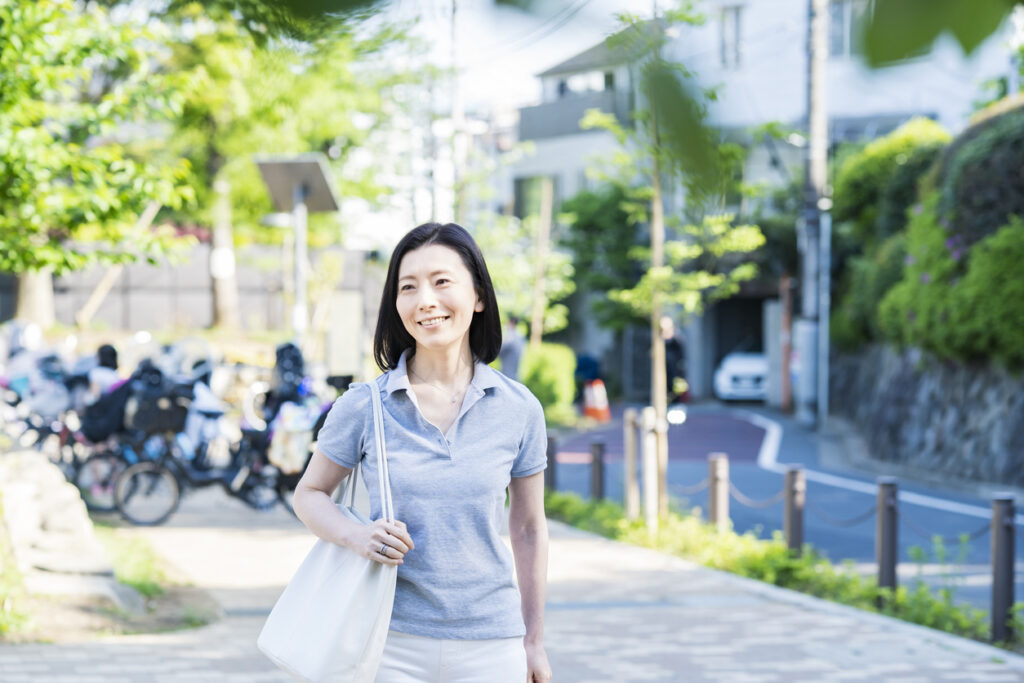 © Photo by iStock: maruco
© Photo by iStock: marucoRemember the earlier list of some perimenopause and menopause symptoms? Essentially, anything “not normal” about you can be put down to (or dismissed) as being part of either, which means you need to advocate that much harder for yourself to your doctor to get taken seriously.
According to a March 2022 survey by the Ministry of Health, Labor And Welfare, 28.3% of women in their 40s, 38.3% in their 50s, and 27.7% in their 60s believe they have symptoms of menopause, but only 3.6%, 9.1%, and 6.9% of women in said age groups see their doctor for a proper diagnosis or treatment.
While this survey was given to 5000 men and women (which is problematic as male menopause is a different experience), what the study concluded is that about 80% of Japanese women “don’t bother” speaking to their primary care physicians about any symptoms they may be experiencing.
“I get too hot at night and sometimes I can’t sleep. So what? All the doctor is going to do is tell me to lose weight and take sleeping pills” (Japanese woman, 50s).
Doctor Shopping
Those who do speak to their doctor about any symptoms often have the above experience, which has led to the phenomenon of “doctor shopping.” While Japan may have a national health care service, the amount of time and attention a medical provider can give to an individual patient varies greatly across the country. Essentially, Japanese women find that if they do consult a doctor about peri/menopause symptoms, their concerns are dismissed or ignored, and they are left to suffer in silence.
This is not strictly a Japanese issue, but an international one when it comes to women’s health. “Doesn’t matter what gender the doctor is either. I’ve been told to get over it, that it wasn’t that bad by just as many women as I have men.” (Japanese woman, 60s).
There is a Japan Society for Menopause and Women’s Health that is working to change how women’s health is handled in Japan via workshops, their own medical journal and other activities on a national and international level. They have also worked hard to develop a system that certifies medical professionals with advanced skills and specialized knowledge. From their Japanese site, you can also find listings of these professionals and the clinics they work for.
OTC for Perimenopause & Menopause in Japan
If you are dealing with perimenopause or menopause in Japan, ideally after having been seen by a doctor to confirm this, there are over-the-counter medications that can help alleviate some of the symptoms.
Rubina (ルビーナ)
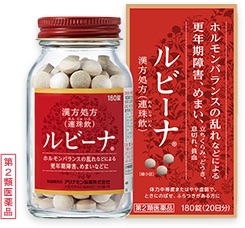 © Photo by Rubina
© Photo by RubinaA supplement based on traditional Chinese medicine that has been recognized by the Ministry of Health, Labor and Welfare. It’s said to be effective in relieving menopausal symptoms by regulating circulation, water metabolism and the autonomic nervous system. Essentially it helps with hot flashes, chills and “feeling flustered.”
Inochi no Haha A (命の母A)
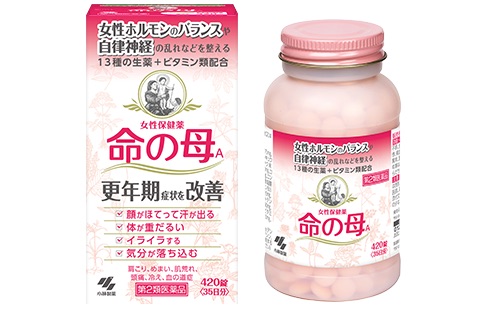 © Photo by Inochi no Haha A
© Photo by Inochi no Haha AA series of OTC medications that treat a range of peri/menopausal symptoms.
- Inochi no Haha A itself is said to aid with various menopausal symptoms caused by hormonal imbalance and autonomic nervous system disorders.
- Inochi no Haha Meguribi (メグリビ) helps with menopausal symptoms and skin problems that arise during perimenopause and menopause.
- Inochi no Haha Active (命の母アクティブ) is for postmenopausal women.
Tsumura Kampo Kamishoyosan (加味逍遙散)
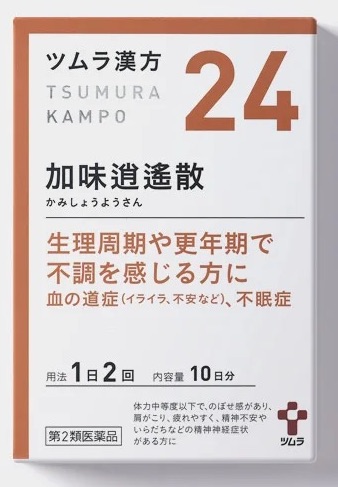 © Photo by Tsumura Kampo
© Photo by Tsumura KampoAnother traditional Chinese medicine that seems to be effective at relieving fatigue, hot flashes, flushing, chills, anxiety and irritability.
Prefemin (プレフェミン)
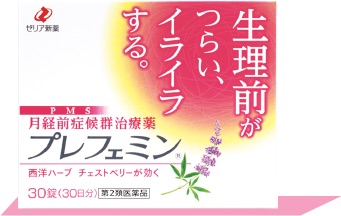 © Photo by Prefemin
© Photo by PrefeminTechnically, it’s an OTC for PMS, but perimenopausal and menopausal women sometimes use it to treat the irritability, depression and emotional sensitivity associated with menopause.
Again, you shouldn’t take any supplements without first speaking to a doctor and checking the ingredients for possible allergens or drug interactions.
May your experience with perimenopause and menopause in Japan be as easy and relatively stress-free as possible!












Leave a Reply